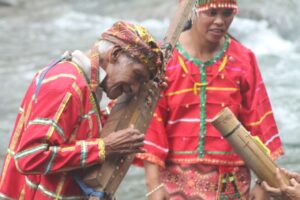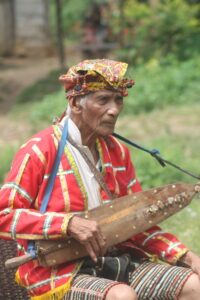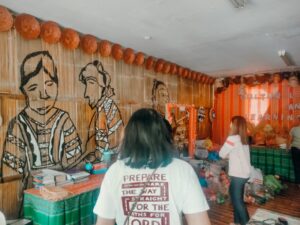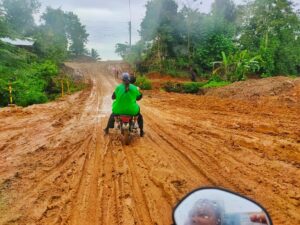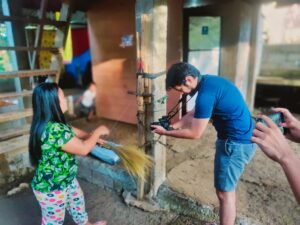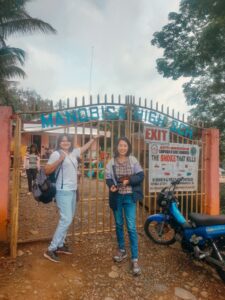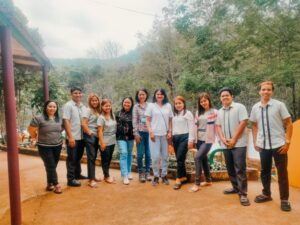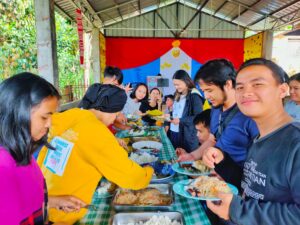To read about the background of the Obo Manuvu, click here.
Ini Kos Konamin Tanong Buwis consists of a cultural rediscovery workshop for church workers in the Philippines, cross-cultural missionaries, the young people (high school youth), and IPED teachers in the City of Magpet. This will culminate in a celebration of cultural diversity, featuring the music from the tribes, their dances, and other artwork. The framework for creative output will be based on the national motto: Maka-Diyos, Maka-tao, Makakalikasan, Makabansa.
You can be a part of this!
It is estimated that 80% of the world have limited literacy skills and prefer to learn and communicate through oral means (Lovejoy, 2012). According to World Bank, 70% of 10-year-olds are unable to read and understand a simple text (World Bank, 2022). Non-print forms of communication like songs, dances, proverbs and poetry, visual arts, drama are invaluable tools to aid in literacy, to help teachers teach more effectively, and to help students learn in an enjoyable and interactive way.
Art forms are a window to understand a people’s cultural beliefs, values, practices. They allow for the expression of feelings in creative and powerful ways (Foerster and Saurman, 2021). Integrating and incorporating cultural art forms in the classroom allow the students to learn through their own language and culture that are most meaningful to them. This affirms their identity, contributing to their holistic development, even as it enables them to better and more quickly comprehend concepts taught in the classroom.
Overview:
This training is designed for cross-cultural workers, community facilitators, and arts enthusiasts who want to be advocates of cultural identity and their arts for Kingdom building. At the end of this training, the trainees will:
- appreciate and respect their unique identity and that of different people groups
- be keenly aware of the different art forms and the different ways they function in cultures
- learn cultural sensitivity in cross-cultural settings
- learn what the Scriptures teach about artistic expressions and apply these principles in specific cultural contexts
- experience the freedom to creatively express themselves using different art forms
You can expect these to happen:
- Dialogues between indigenous communities in the preservation of their communal stories, including the identification of their milestones, aches, dreams, and hopes
- Collaboration between indigenous artists and non-IP artists to produce creative works that are culturally relevant
- Transfer of knowledge on tribal heritage between the older and younger generations, cultural masters and the youth
- The creation of dances, poems, songs, and other art forms representative of the sound of and messages from the different tribes in the (southern) Philippines, particularly the Obo Manuvu in Magpet
- The training of facilitators and the community in principles that will help sustain cultural growth in the arts (applicable also for other cross-cultural settings)
- The transformation of negative attitudes and judgments into a respect, love, and honor of cultural-linguistic identity
- The celebration of tribal identity and their creative work
Workshop Topics & Schedule
| Phase 1 | Day 1: | Day 2: | Day 3: | Day 4: |
| Goal | Overview of art forms and its presence in people groups and cultural communities | Awareness of how culture affects communication; arts as representation of worldview | Gain observation and listening skills for deeper cultural awareness | Learn how aspects of culture are incorporated for more meaningful communication (e.g. in worship, for outreach, education, etc.) |
| 8:30 | Introductions (name-tag), Trainee’s expectations
/ 2-Track approach |
Arts with God1: Identity in Christ | Scriptural Foundations – Building a Bridge | Scriptural Foundations – What Is True Worship? |
| 9.15 | Visual Arts | Anthro 1: Culture and Worldview | Looking into Art Forms (7 Lenses plus) | Critical Contextualization |
| 10.15 | Break | Break | Break | Break |
| 10.45 | Food | Arts, Music & Meaning | Research 1 – ROAD / Asking questions, Documentation | Interview with Cultural Bearer 2 |
| 12 | Lunch | Lunch | Lunch | Lunch / Dismissal |
| 1 | Dance and Drama | Anthro 2: Worldview-Etic-Emic | Research 2 – Listening / Participant Observation | Facilitating Workshops |
| 2 | Music | Arts as communication | Interview with Cultural Bearer 1 | Case Studies
Challenges and Mistakes |
| 3 | Break | Break | Break | |
| 3.30 | Oral-Verbal Arts | Processing activity: what are the implications in ministry / education?
Highlight board Questions and answer |
Anthropology, Culture & Arts (Considering People & Context) | Planning for next steps / Dialogue |
| 4.30 | Dismissal | Dismissal | Dismissal |
| Phase 2 | Week 2 Day 1 | Week 2 Day 2 | Week 2 Day 3 | Week 2 Day 4 |
| 8:30-9:00 | Introduction/ Getting to know you game | Prayer / Devotions* | Prayer / Devotions* | Preparation |
| 9:00-10:15 | Overview of the Arts / Exploring Culture | Share Creations / Insights | Share Creations | Culminating Activity / Cultural Festival |
| 10:15-10:40 | Merienda | Merienda | Merienda | |
| 10:40 – 12 | Exploring music & songs | Exploring food | Oral – Verbal arts (poetry, proverbs, storytelling, jokes, etc.) | |
| 12:00 – 1:00 | Lunch | Lunch | Lunch | Lunch / Dismissal |
| 1:00 – 2:30 | Exploring dance | Visual Arts | Growing Fruit / Next Steps | |
| 2:30-2:50 | Merienda | Merienda | Sharing of next steps | |
| 2:50-3:30 | New Song | Attitudes towards using our cultural art forms | Preparation for Culminating | |
| 3:30-4:15 | Creation / Reflection Time: What are we grateful for in our culture? | Creation / Reflection Time: What are some cultural issues & concerns in your community? Express this through an art form | Culminating Activity – Sharing of selected creations, Testimonies, Giving of Certificate
|
|
| 4:15-4:30 | ||||
| 4:30-5:30 | Merienda | |||
| Workshop topics and schedule prepared by Roce Anog-Madinger, International Orality Studies | ||||
This project consists of a series of cultural discoveries, Scriptural studies, and creative workshops that will culminate in a celebration of cultural diversity. Output includes a compilation of music, song and dance; documentation of newly-created artistic expressions; and stories from selected participants.
A workshop solely for IPED teachers will happen afterward to further strengthen the indigenous community of Magpet.
Registration Fee: P3,000
(Inclusive of food during seminar days and land transportation from the Davao airport to Magpet, North Cotabato, and back to Davao)
Please note that we will have missionary accommodations (classrooms). Please bring your own sleeping bag and mosquito net! For special accommodations outside of Manobisa and dietary concerns, please get in touch with Star Maglajos at 09466430688.
For church workers, youth, and missionaries (CWYM Workshop)
CWM Workshop: 10 days (please email us at mindanao@onevoicemagazine.com for specific dates)
Culmination: Festival/Recital of Ethnoarts Workshop Participants
For IPED Teachers (IPED Teachers Workshop ONLY)
PHASE 1 Cultural Discovery (please email us for specific dates)
PHASE 2: Training: (please email us for specific dates)
Culmination: Festival/Recital of Ethnoarts Workshop Participants
Payment Method:
Gcash: 0995 158 0695 (MI***H EU***E A.)
After paying, please send a picture of the deposit slip or a payment confirmation screenshot of the transaction to mindanao@onevoicemagazine.com. You can expect us to get in touch with you!
For this project, WhatMag Inc. is in current partnership with:
Institutes for Orality Strategies
SIL Philippines
Revival Generation
The churches of Magpet
Manobisa High School
All those who complete PHASE 1 and PHASE 2 of the workshop will receive a certificate of participation by SIL Philippines. For specific details like the exact dates of these events and the venue of the workshops, please email mindanao@onevoicemagazine.com.
References:
Lovejoy, Grant. The Extent of Orality. Journal for Baptist Theology & Ministry. 2008. https://www.galaxie.com/article/jbtm05-1-11
World Bank, The. 70% of 10-Year-Olds now in Learning Poverty, Unable to Read and Understand a Simple Text. https://www.worldbank.org/en/news/press-release/2022/06/23/70-of-10-year-oldsnow-in-learning-poverty-unable-to-read-and-understand-a-simple-text
Foerster, Liz and Saurman, Mary Elizabeth. Producing Culturally Relevant Language Development Teaching Materials Manual and Handouts. SIL International, 2021.

